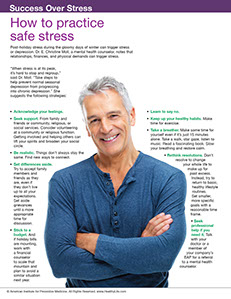SYMPTOM CHECKER
CONDITIONS
Male
Female
Child
Arm, Hand & Shoulder Concerns
Legs & Feet Concerns
Dental & Mouth Concerns
Ear & Nose
Eye Conditions
Head Conditions
Arm, Hand & Shoulder Concerns
Legs & Feet Concerns
Front
Back
Arm, Hand & Shoulder Concerns
Dental & Mouth Concerns
Ear & Nose
Eye Conditions
Head Conditions
Arm, Hand & Shoulder Concerns
Dental & Mouth Concerns
Ear & Nose
Eye Conditions
Head Conditions
Front
Back
Arm, Hand & Shoulder Concerns
Neck Links
Head & Neck Concerns
Arm, Hand & Shoulder Concerns
Neck Links
Head & Neck Concerns
Front
Back
Online Clinic
Wise Healthcare
How to practice safe stress

Print on Demand
Post-holiday stress during the gloomy days of winter can trigger stress or depression. Dr. E. Christine Moll, a mental health counselor, notes that relationships, finances, and physical demands can trigger stress.
“When stress is at its peak, it’s hard to stop and regroup,” said Dr. Moll. “Take steps to help prevent normal seasonal depression from progressing into chronic depression.” She suggests the following strategies:
• Acknowledge your feelings.
• Seek support. From family and friends or community, religious, or social services. Consider volunteering at a community or religious function. Getting involved and helping others can lift your spirits and broaden your social circle.
• Be realistic. Things don’t always stay the same. Find new ways to connect.
• Set differences aside. Try to accept family members and friends as they are, even if they don’t live up to all your expectations. Set aside grievances until a more appropriate time for discussion.
• Stick to a budget. And if holiday bills are mounting, work with a financial counselor to scale that mountain and plan to avoid a similar situation next year.
• Learn to say no.
• Keep up your healthy habits. Make time for exercise.
• Take a breather. Make some time for yourself even if it’s just 15 minutes alone. Take a walk, star gaze, listen to music. Read a fascinating book. Slow your breathing and restore calm.
• Rethink resolutions. Don’t resolve to change your whole life to make up for past excess. Instead, try to return to basic, healthy lifestyle routines. Set smaller, more specific goals with a reasonable time frame.
• Seek professional help if you need it. Talk with your doctor or a member of your company’s EAP for a referral to a mental health counselor.
This website is not meant to substitute for expert medical advice or treatment. Follow your doctor’s or health care provider’s advice if it differs from what is given in this guide.
The American Institute for Preventive Medicine (AIPM) is not responsible for the availability or content of external sites, nor does AIPM endorse them. Also, it is the responsibility of the user to examine the copyright and licensing restrictions of external pages and to secure all necessary permission.
The content on this website is proprietary. You may not modify, copy, reproduce, republish, upload, post, transmit, or distribute, in any manner, the material on the website without the written permission of AIPM.
2021 © American Institute for Preventive Medicine - All Rights Reserved. Disclaimer | www.HealthyLife.com
















































